Camping of any sort is fun. But if you are deciding between a backpacking trip and a camping trip, sometimes it’s tough to know what to put your energy into. Should you go on a week-long camping trip? Or a week-long backpacking trip? Which one is better? Or rather, which one is better for you?
Before we begin, let’s quickly define the two.
What’s Camping?
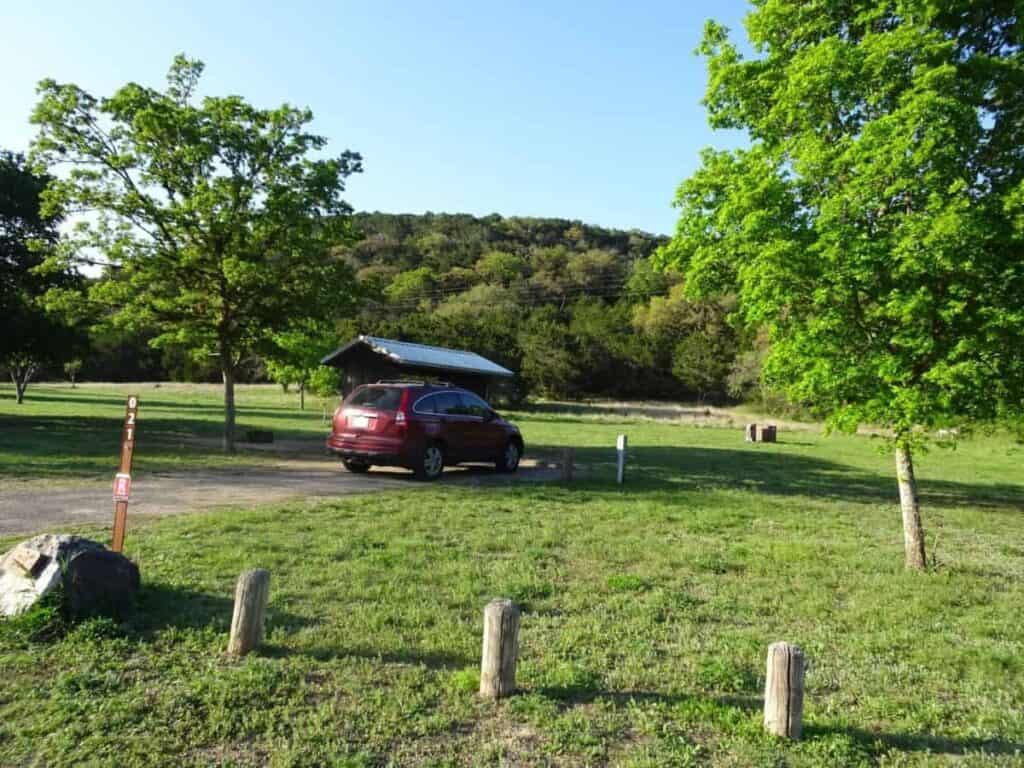
The most common meaning when people say “camping” means “car camping” which means camping within close proximity (often within sight) of your car. You drive up to your campground, either at a city, state, or federal park, and then you park, make a few trips carrying your stuff to your camping pad, and spend a night or two there.
By the way, as an Amazon Associate, I earn when buying qualified products through links on my site.
“Car Camping” can also mean to literally sleep within your vehicle. I’ll be referring to the first definition of camping (meaning you are still sleeping in a tent), but to be fair, the experience of camping in your car isn’t wildly different from sleeping in a tent.
Many camping locations are nearby to cities and civilization in general.
What’s Backpacking?
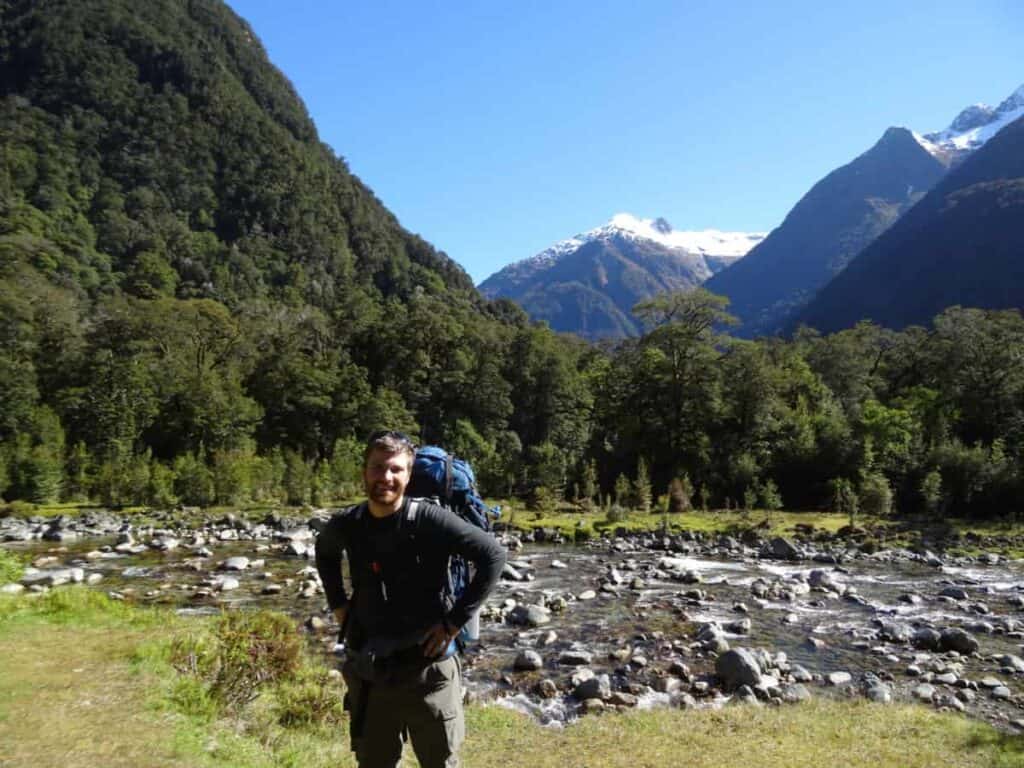
The term backpacking means you are carrying all of your camping gear on your back (or perhaps shared among a few others), to wherever you mean to go.
Backpacking often has a destination in mind, but not always. Sometimes a backpacking trip is a thru-hike, or a loop with no end point, where the entire purpose of the trip is to enjoy the scenery and to enjoy the physical challenge of carrying your house on your back.
Instead of breaking camp at a very well-established campsite with a fire-pit and a picnic table, you are breaking camp at some random point near the trail, and your goal is to leave no evidence at all that you were ever there.
There are many backpacking trips where you are aiming to reach a specific feature, such as a mountain, a lake, or a river. You create a base camp where you leave the tents and gear up, leaving you able to explore and enjoy your time in the wilderness without your heavy pack.
Many backpacking locations are remote and secluded.
The Showdown
To compare camping vs. backpacking, we’ll discuss both in these categories:
| Category | Camping Score 1-10 | Backpacking 1-10 |
| Calories Burned | 6 | 10 |
| Health | 7 | 7 |
| Peace | 7 | 8 |
| Danger | 8 | 5 |
| Preparation Needed | 7 | 4 |
| Total Costs | 6 | 4 |
| Beauty | 7 | 10 |
| Coolness Factor | 7 | 10 |
| Comfort | 6 | 3 |
| Food | 9 | 4 |
Calories Burned
Backpacking burns an incredible amount of calories because it is extremely strenuous.
Generally, backpackers strive for a base weight (pack weight without food and water) between 15 to 25 lbs (7-11 kg). A rule of thumb is that your pack weight should not exceed 1/5th your body weight.
So, let’s say a backpacker weighing 185 lbs (83 kg) with a pack weighing 35 lbs (15 kg) is traveling 12 miles (20 km) in a day (not an unreasonable amount for a full day of hiking), walking around 2 mph on moderate terrain with a moderate slope (which will come out to 6 hours of hiking, not including breaks). According to the calories burned calculator on GreenBelly.co, that backpacker will burn around 560 calories an hour and be burning around 3360 calories for one day.
This doesn’t count the calories burned pitching camp that a backpacker will inevitably burn.
In contrast, for just camping, which involves a lot of sitting, standing, and carrying things from place to place, I used the calorie calculator on FitWatch.com for the activities “cooking, light housekeeping” and “light to moderate packing/unpacking” to estimate that someone weighing 185 lbs (83 kg) might burn between 220 and 308 calories per hour while camping.
The only way for camping to really compete with backpacking, in calories burned, is if a car camper bundles another activity in the trip, such as hiking, mountain biking, kayaking, etc. Backpacking has the exercise built in.
Score
Backpacking: 10/10
camping: 6/10
Health
Physical
There’s so much to do in the outdoors! It’s difficult to laze about if you’re camping and especially difficult to when you’re backpacking.
Backpacking
As mentioned in the calories burned section, backpacking burns a lot of calories. But is it healthy for you?
Although backpacking is tremendously good exercise, anyone who has gone knows that it can be quite painful. Your body experiences intense repetitive stress over long periods of time.
If you haven’t trained in your current pair of shoes, or if your feet get wet, then your feet will likely blister, which can be very painful. If your shoes don’t support you well, then backpacking with a heavy weight can put a lot of stress on your arches and cause pain.
Your ankles will receive a lot of stress from constant flexion and extension as well as pronation and supination from the uneven ground. Even though there are hiking boots that try to help, some argue that strong ankle supported shoes can exacerbate this problem.
If you have knee problems, you will feel them. On my last backpacking trip, I felt intense knee pain for the first day… amazingly my body was able to either get over it, or I had damaged some nerves because it felt better the next day. It’s clear that the constant bending and unbending will cause discomfort if you already have knee problems. If you have knee problems, you need trekking poles, they are relatively inexpensive and they make a huge, huge difference on your knees.
Your hips will hurt. Trekking packs are designed to put the weight on your hips, which is much better than on your shoulders. however, even if your pack is only 25-30 lbs, your hips will still be tender, and sometimes even bruised from the constant pressure.
I’ve never seen a pack, expensive, or cheap, that didn’t end up hurting the wearer after 10-12 miles. This is something your body can and does adjust to, but unless you are going backpacking multiple times per year (many people only get to go once a year), you are going to experience these same pains.
Because of that, backpacking loses a couple of points in the health category. Even though backpacking is a great exercise, it is hard on your body, especially if you go backpacking infrequently and if you don’t do enough training (don’t feel bad, many people don’t because it’s not fun to walk around your neighborhood with canned food in a backpack).
That being said, I’ll share briefly that I’ve been pushed to my physical limits more times while backpacking than any other activity. Backpacking is exhausting, hence why it’s such good exercise. It’s very satisfying to overcome the tiredness, though. If you like a challenge, it’s completely worth the sacrifice.
Camping
As mentioned, just the act of camping doesn’t burn a lot of calories, but it does give you immediate access to amazing exercise opportunities. After you eat breakfast at camp, you usually have access to trails, rivers, lakes, and other natural features that campgrounds tend to be close to.
When you’re backpacking, you have to keep moving forward if you want to get out of the woods. If you’re camping and going for a day hike or mountain biking you can always turn around and pace yourself to your personal physical level. You can more safely push yourself without stranding yourself in the middle of the wilderness.
Because of that, camping gains a couple health points.
Mental
Nature helps us to be mentally healthier. I wrote an article about several scientific studies showing evidence that being around nature can help our emotional health.
The difference between camping and backpacking here is a lot more difficult to quantify since it’s very difficult to study huge groups of participants who get to travel in the wilderness.
However, one of the studies mentioned in my article talks about how the emotional lift from being around nature is more intense when the scenery is more dramatic or spectacular.
Camping can definitely bring you to some amazing views, but you are likely to be around some more mundane features, such as roads, other campers, RVs, etc. To summarize, you are much more likely to see spectacular views when you are backpacking in more remote locations.
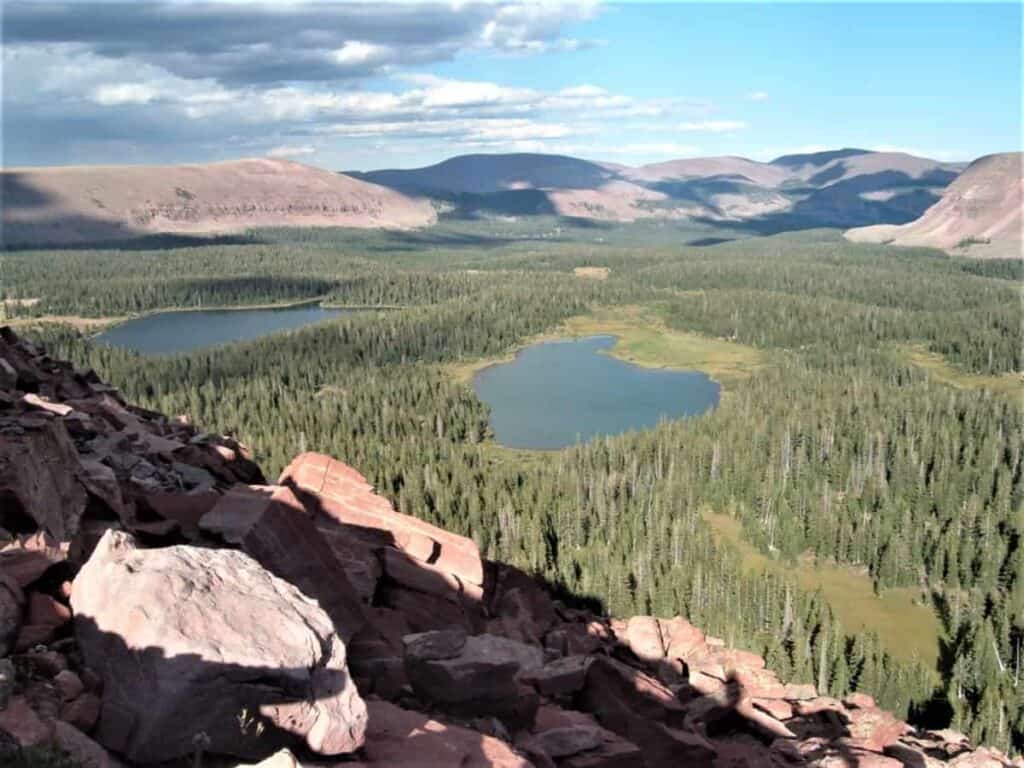
Score
Backpacking: 7/10
Camping: 7/10
Peace
Some of the most peaceful experiences I’ve ever had have been outside experiencing this beautiful planet.
Backpacking
Truly nothing can beat the peace of being out in the middle of nowhere, with only the wind to keep you company. This kind of experience doesn’t resonate with everyone, but for me and for many others, being out in the wilderness dozens of miles from any civilization is a peaceful experience.
I remember one time where we camped in sight of a lake high up in a basin nestled in the mountains where very few people go in a year. I woke up first and put my head out of the tent and saw the water vapor coming off of the lake (it was pretty cold out), and I remember feeling a powerful calm as I enjoyed the scene. I’ll never forget that moment.
It’s not perfectly peaceful in the wilderness, though. You are relying on your own navigation skills and on your own capabilities, and sometimes it can be nerve-wracking if you lose your bearings or can’t get a fire started when it’s raining in the wilderness. Furthermore, your tent is the only protection you have to the elements, and that can be a little hard mentally, especially if you hear critters moving around outside.
If you want to see the likelihood of getting attacked by a wild animal while in a tent, see my article here. (spoiler alert: you have little to fear, the chances of having issues like that are extremely low.)
Camping
When we go camping, we often bring our hammock. After the bustle of pitching our tent and preparing dinner, laying in a hammock and enjoying the trees, and the wind settles my mind and calms me down. I don’t know if hammock therapy is a thing yet, but it should be.
Since camping brings you out to nature, you can experience the peace that comes from the quiet of the outdoors.
People are great… sometimes. Unfortunately while camping you are more likely to be in close quarters with other people. This generally is wonderful and brings a sense of security. However, it can cause issues.
We’ve had a couple of times where a scout group was in the same campground. One story, in particular, we were getting ready for bed at around 10 PM when we saw 5-6 carloads of scouts roll in and pitch their tents in complete darkness immediately next to our campsite. They did a fairly good job considering the circumstances, but there’s only so much 10-12-year-old kids can do without making a sound.
It’s inevitable while camping you’ll have an experience like this on occasion. Bring earplugs. ?
Score
Backpacking: 8/10
Camping: 7/10
Danger
Experiencing life the right way means taking risks. Travelling, the outdoors, and driving to work all have risk.
The question becomes, which is more dangerous, camping or backpacking?
Backpacking
Backpacking is more dangerous than camping for several reasons:
- You usually have to drive longer distances to locations where you backpack. Not only that, but usually you have to get an early start, and you usually don’t sleep super well on the ground while you’re camping, so it’s very likely that at some time in the trip you will be driving while sleep deprived.
- Getting lost. Although some trails are very well marked, some are not at all. I’ve been on several trails where we would constantly lose and find the trail and had to rely on our compass skills and a map to make sure we were headed in the right direction. I have a couple of stories of getting lost while backpacking that I won’t go into. ? If you’re backpacking solo, please consider getting an emergency GPS system (see price on Amazon) so you can call Search & Rescue if you are in a dire situation in the wilderness.
- Getting caught out in bad weather is a much higher risk. If you’re going into the mountains, especially, the weather can change unexpectedly and bring weather you aren’t prepared for. Generally, you can mitigate this by only backpacking in the late summer months.
- Twisting an ankle or breaking a bone has much more serious consequences. When you’re camping and you go for a day hike, twisting your ankle or breaking a bone in your foot means at the worst that you will have to muscle through a couple of miles of pain to get to medical help. When you’re in the wilderness, then a broken bone be very serious.
- Dehydration. Becoming dehydrated is a risk anywhere, but it’s especially important to maintain hydration while backpacking since you are exerting a lot of energy and sweating because of your pack. When you’re camping, 3 liters of water generally is enough for your day hike, but while backpacking, you are relying on streams and rivers for water, along with your filtration system. To see how much water is necessary while camping, check out our article here.
That list makes me sound negative. I would never recommend someone to not go backpacking because of safety reasons. It’s totally worth it! With these risks come incredible rewards, and if you plan well and are safe, you can mitigate most of these risks.
Camping
Camping has its risks, too. Most of these risks are shared by backpacking camping, though, so it gets a better score on danger.
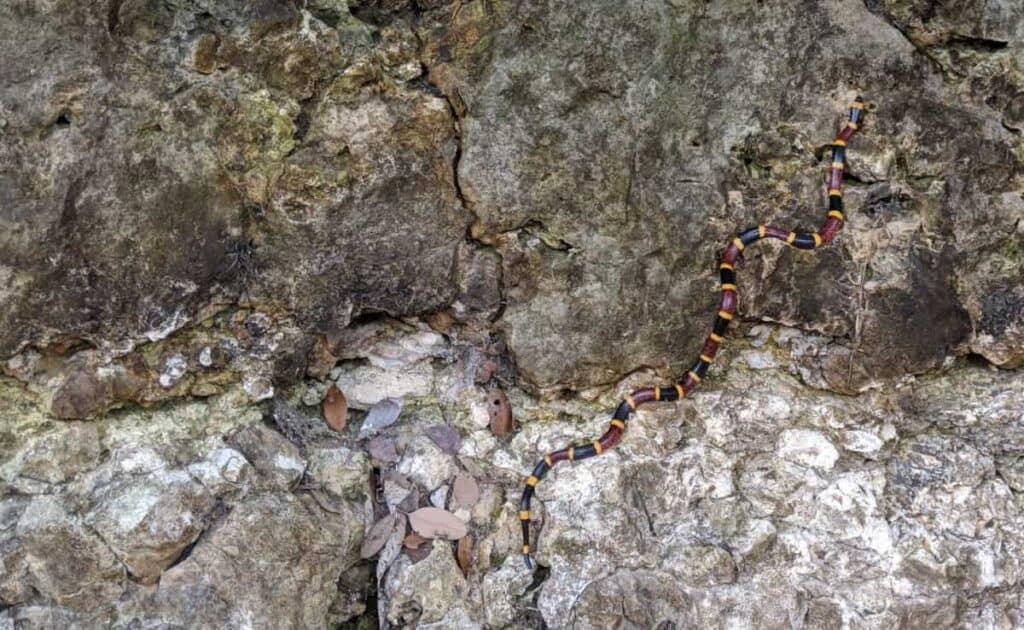
When in nature, you’ll find dangerous critters. This picture of a coral snake was taken on a nature trail near our house, and not near a campground. Snakes are anywhere there is nature (and often where you don’t want them to be). It follows that spending time in nature means you are at a higher risk of encountering a dangerous animal.
Campgrounds have more vehicles. We’ve been to several campgrounds where kids are running around the campground including on the roads between campsites. There are several large vehicles such as RVs and trucks in campgrounds, so you’re more at risk of an accidental collision in these circumstances.
In summary, camping is generally safer than backpacking.
Score
Backpacking: 5/10
Camping: 8/10
Preparation Needed
Preparing for backpacking is much more work than camping. Camping can be a lot of work all on its own, especially if you don’t have your gear organized yet.
Backpacking
Because you are not going to be navigating on any roads, and it’s likely you will not have any cellphone service, it’s much more important to plan your route carefully beforehand. Making sure you have a good map, and investing in a detailed guidebook that can describe the landscape (especially with pictures) so you can find what you need to make preparation for backpacking more involved.
Furthermore, ensuring your pack weight is low enough for your needs takes a lot of practice. It’s really easy to bring too much, and it takes work to pare down to the necessities. With camping, you can just throw it in the car just in case, and there’s no harm done. If you bring an extra bottle of propane that you don’t need, you have to carry it for potentially dozens of miles.
Lastly, food prep takes a lot of thought to make sure you save as much weight as possible, and that you get the proper calories you need since you are burning so many.
Camping
Camping takes a lot of preparation as well if you aren’t accustomed to it. There are dozens of items to remember and some of them can make a trip miserable or very inconvenient if you forget them.
If you want to make preparation for camping simpler and want to get out the door quicker, we wrote an article with some crucial tips that will help you get outside without all the delays.
Probably the most important key to making preparation for camping easier is to just do it once and then section off that gear solely for camping (read our article on this for more details).
Score
Backpacking: 4/10
Camping: 7/10
Total Costs
Camping is fun, but it isn’t a free hobby, as you might initially think. Camping (especially as you get into it more) requires gear. The costs for all that gear adds up.
Backpacking is much more costly than camping (generally), because of the premium for lightweight high-quality equipment. The price gap between backpacking gear and camping gear is even higher if you are trying to get into “ultralight” backpacking.
Ultralight is a category of backpacking all on its own where the goal is to carry as little weight as possible, allowing for longer distances traveled. Ultralight equipment can be much more expensive because ultralight gear seeks to maintain the quality of heavier gear while cutting down on the weight.
I wrote an extensive article analyzing the costs of camping, and you can see for yourself how much more expensive backpacking is than camping with medium-high quality gear.
Score
Backpacking: 4/10
Camping: 6/10
Beauty
This is an amazingly tough category to figure out since I’ve personally seen amazing sights with both camping and with backpacking.
Backpacking
I’d say the most breathtaking views have been in remote, and difficult to access locations. Mountains are best experienced up close.
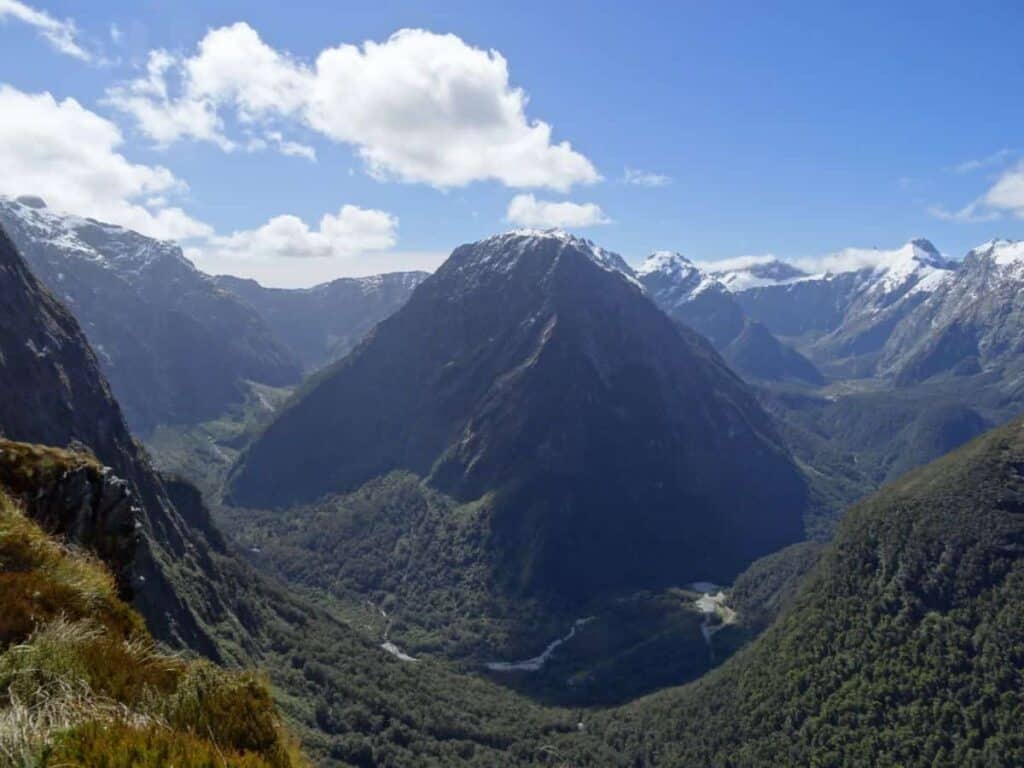
The feeling you get when you crest a mountain, or a pass is indescribable. It’s as if your head spins and your heart drops at the same time. The awe that you feel is impossible to replicate unless you experience it for yourself.
Backpacking helps you get to these places. Places that are inaccessible from roads for one reason or another, and require your two feet to get you there.
Camping
While camping in New Zealand, we found a very obscure campsite where we were the only ones there, and yet we were just a short walk to this view:
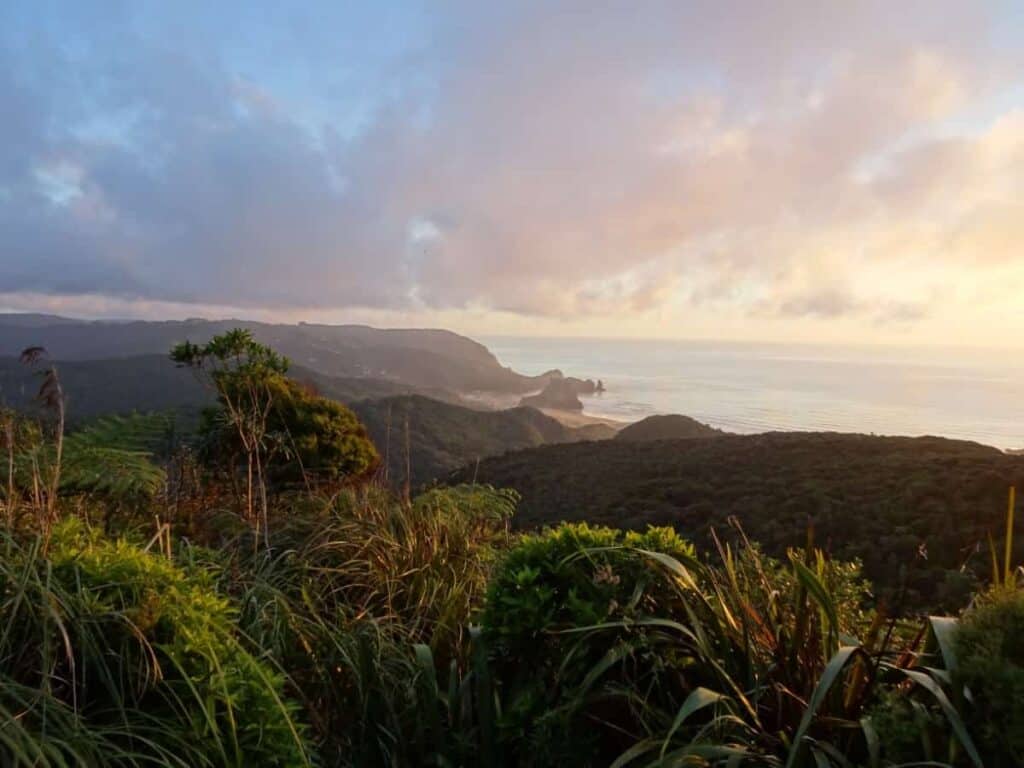
At another time, we were camping in not so much of an exotic location–at a state natural area about 60 miles (96 km) from our house, and we got to watch the sunrise:
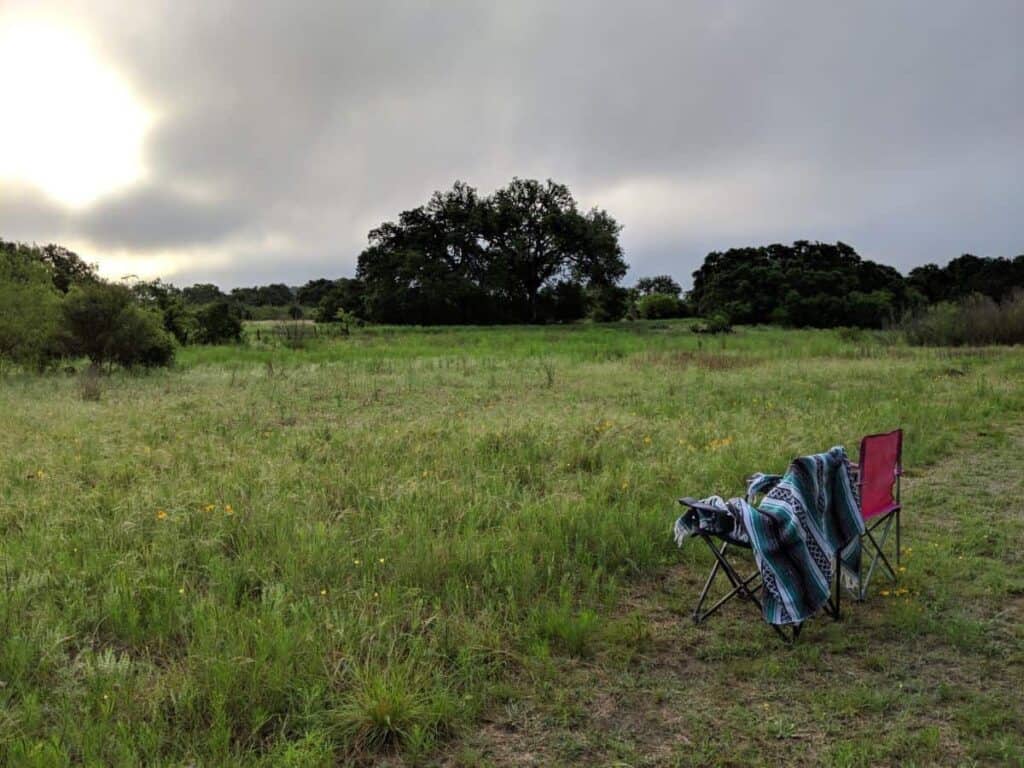
Case in point, you can see some amazing things even with camping.
Score
Backpacking: 10/10
Camping: 7/10
Coolness Factor
So… Aside from all practical comparisons, there is a coolness factor between camping and backpacking.
Camping is cool, don’t get me wrong, but you definitely feel awesome after an 18-mile hike (28 km). Just with surmounting any challenge, the exhilaration you feel when you overcome the discomfort and trial, you get a high from your endorphins from the experience.
Competence also leads to self-confidence. Camping is also great for this since there are a hundred tasks to do that require some knowledge, and backpacking there are tons more. Navigating via map and compass, pitching a tent in less than ideal conditions, learning how to use the gear of your pack and trekking poles, and a dozen more little things. All of these come together to make you feel like you’re awesome. And you are!
Score
Backpacking: 10/10
Camping: 7/10
Comfort
There’s a certain expectation that when we spend time outdoors that we are not going to have the same comforts as we do at home. But in this comparison between camping and backpacking, there are some important differences
Backpacking
One of the trials of backpacking is that you are truly roughing it when it comes to using the bathroom. With camping, you may get flush toilets or you may get an outhouse, but with backpacking, you’ll be digging a hole in the ground.
Using the bathroom outside is a definite point of discomfort while backpacking, especially for ladies, and is probably one of the most dreaded experiences for many people.
I won’t invalidate that. It can be tough. I will say that it becomes less of a big deal with practice and experience.
With backpacking, you’ll be filtering or treating all your water, as there are no drinking fountains in the wilderness. This can be arduous, as we are accustomed to drinking water whenever we are thirsty. In a group of people waiting for the filter to work, you may have to experience some thirst.
Lastly, your bedding will not be as fleshed out as when you are camping. You can buy very nice air mattresses, but because you are carrying everything, you can’t afford to bring big pillows and thick inflatable air mattresses with you to the wilderness.
Camping
Camping can be as rustic as you want it to be. If you want to just go with a sleeping bag, a sleeping pad, and a tent, as you would if you were backpacking, that’s up to you. You do, however, have the option of using normal bedding and pillows, or inflatable mattresses that would not be feasible for backpacking.
While camping, you generally have access to some level of a restroom facility. Many campgrounds have flushing bathrooms, and others do not–it just depends on where you are camping.
Many other campgrounds have picnic tables and fire pits ready for you. This is a convenience that you don’t know how much it can help until you try to prepare dinner on the ground.
If you are camping outside established campgrounds, then you still have a vehicle, which means you can pack around a portable toilet, which can comprise of a 5-gallon bucket and some padding to sit on. While not glamorous, it’s definitely easier than doing your business in a hole in the ground.
Score
Backpacking: 3/10
Camping: 6/10
Food
Lastly… food.
Backpacking
When you’re backpacking, you will be amazed how hungry you can be, but how little you want to eat the trail mix you brought. To this day, I have an aversion to trail mixes with peanuts and M&Ms in them.
Backpacker food often is comprised of re-hydrated food, such as Mountain House (see here for an example on Amazon), trail mixes, and jerky. High calorie, high protein meals are ideal for backpackers since you need as much energy in as little space as possible.
Suffice it to say, you can get tired of it quickly. I remember we caught some fish up in the high Unita mountains, and I’m not a huge trout fan. That night, though, we had burned so many calories that the fish was delicious and I ate extra helpings.
Camping
Tinfoil dinners, hamburgers, hot dogs, dutch oven peach cobbler, and a thousand other things. So much is possible to cook on a grill or over a campfire. If you’d like to learn how to cook over a campfire, see my post here with tips on what fire styles to use and some tips for better meal success.
Score
Backpacking: 4/10
Camping: 8/10
Who wins?
Well, to be honest–I don’t think there could ever be a winner in this comparison. Hopefully, though that gives you a better idea of the differences between the two and can help you decide which activity works better for you. If convenience and comfort are more important to you at this stage, I’d say get into camping (it’s SO fun).
If you’re up for some adventure and would love the physical challenge, then backpacking is an amazing thing to try.

